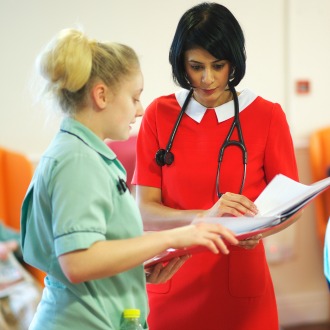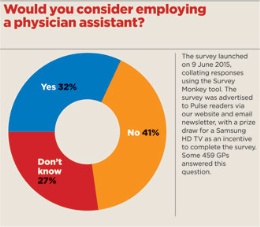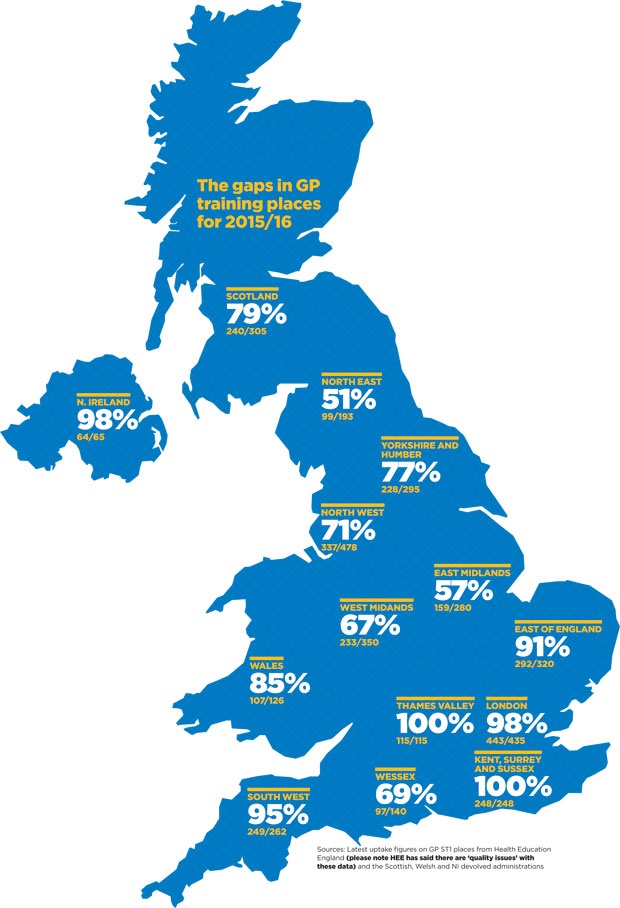Drive to recruit non-GPs accelerates

The Government is pushing ahead with plans to have 5,000 new physician associates, pharmacists and other practice staff in place by 2020. And it will need them.
Pulse has revealed widening gaps in the supply of new GPs; some 20% of GP training places across the UK remain unfilled after the usual recruitment rounds for GP training this year. This compares with gaps of 13% in England and 11% in Scotland last year – figures then described as the ‘worst ever’ by the GPC.
Furthermore, the regional divide is widening, with one area filling only half of its GP places.
This growing shortfall makes it almost impossible for health chiefs to deliver the Government’s promise of 5,000 new GPs by the end of this parliament. So they are thinking outside the GP box.

In England, the NHS has committed to £15m investment to recruit 300 pharmacists to work in GP practices to provide advice, monitor patients and develop medication plans.
In his ‘new deal’ for general practice, health secretary Jeremy Hunt also pledged to recruit 1,000 new physician associates to work in practices by 2020. And Pulse has learned that ministers are in talks about potentially giving prescribing powers to this new class of primary care worker.
This would widen their current role, but not all GPs are convinced of the value of taking on a physician associate – or physician assistant – with more than 40% of GPs asked in a recent Pulse survey saying they would not consider employing them in their practice.
In response to the survey, Dr Zishan Syed, a GP in Kent, says: ‘It is an unacceptable threat to patient safety to allow other professionals to work in GP-like roles without doing the [same] assessments.’
GPC chair Dr Chaand Nagpaul says not enough is known about the cost-effectiveness of taking on this new grade of staff. He says: ‘Physician associates are being trumpeted as a support to GPs before we really understand what they can do. More immediate concerns like retaining existing GPs need to be addressed first.’
Despite this, the Department of Health told Pulse that GPs who already employ them ‘say they love them’.
Meanwhile, the plans from NHS England to recruit 300 in-practice pharmacists to work in practices also appear to be somewhat frayed.
As part of the three-year pilot schemes announced by chief executive Simon Stevens, they will be employed directly by practices – likely as part of federations – in ‘areas of greatest need where GPs are under greatest pressure’.
But it emerged NHS England would only fund 60% of the costs of the pharmacists to practices for the first 12 months of employment, falling to 40% for the second year and then to 20% for the third.
Family Doctor Association chair Dr Peter Swinyard says this will not be affordable for many: ‘It’s hard to imagine a small practice being able to afford 40% [of a £35,000 – £60,000 salary] unless money comes back from prescribing savings… No? Thought not.’
But others are more supportive. GPC training, education and workforce subcommittee chair, Dr Krishna Kasaraneni, describes the move as‘encouraging’.
However, he adds: ‘We will need to look closely at how these pilots operate and ensure the clinical benefits are clear.’
Untrained
Elsewhere, in a worrying development, some areas are looking at getting in untrained doctors to treat patients.
The doctor’s co-operative Shropdoc advertised last month for FY2 doctors to fill a ‘community physician’ role, providing the ‘full spectrum’ of GMS consultations for one of the Prime Minister’s seven-day access pilots.
This caused uproar from GPs on the Pulse website and social media, with the RCGP demanding ‘urgent clarification’ from health education bosses. The advert was later pulled ‘for editing’, but it shows the desperation in some areas as the GP shortage bites.
Mr Hunt has acknowledged his election pledge of 5,000 new GPs by 2020 is now just a ‘maximum’, but there remain question marks over how effectively alternative staff members will be able to fill the gap.

What are the new non-GP roles?
A review commissioned by Health Education England has recommended practices consider employing a wider range of staff due to the shortage of GPs. These include:
Physician associates/assistants
There are only a few hundred physician associates (previously known as physician assistants) working in the UK, although the Government aims to have 1,000 available to work in GP practices by 2020.
Physician associates are science graduates given two years’ training in key areas of general medicine. They must work under the supervision of a doctor as they have no statutory regulator as yet.
According to NHS Careers, they are trained to perform a number of roles including: taking medical histories; performing examinations; diagnosing illnesses; analysing test results; and developing management plans.
More information at fparcp.co.uk
Practice pharmacists
NHS England has announced £15m to fund pilots of pharmacists working in GP practices.
The pilots aim to use pharmacists to provide expertise on treatments; develop bespoke medicine plans for individual patients; assist with communication across a patient’s care pathway, including with GPs, hospitals and social care; and monitor those with complex long term conditions. NHS England says they could also help manage repeat prescription requests and medicines shortages by suggesting suitable alternatives where appropriate.
Apply for the pilots at tinyurl.com/pharm-pilot
Medical assistants
These were recommended for piloting. They would have three months’ training to carry out basic clinical roles, similarly to healthcare assistants, and would also act as the GP’s personal assistant by monitoring messages and emails, chasing results, filling in forms and handling paperwork.
Paramedics
The review said these members of staff could be used to assess whether urgent visits are required.
Source: Primary Care Workforce Commission, July 2015









